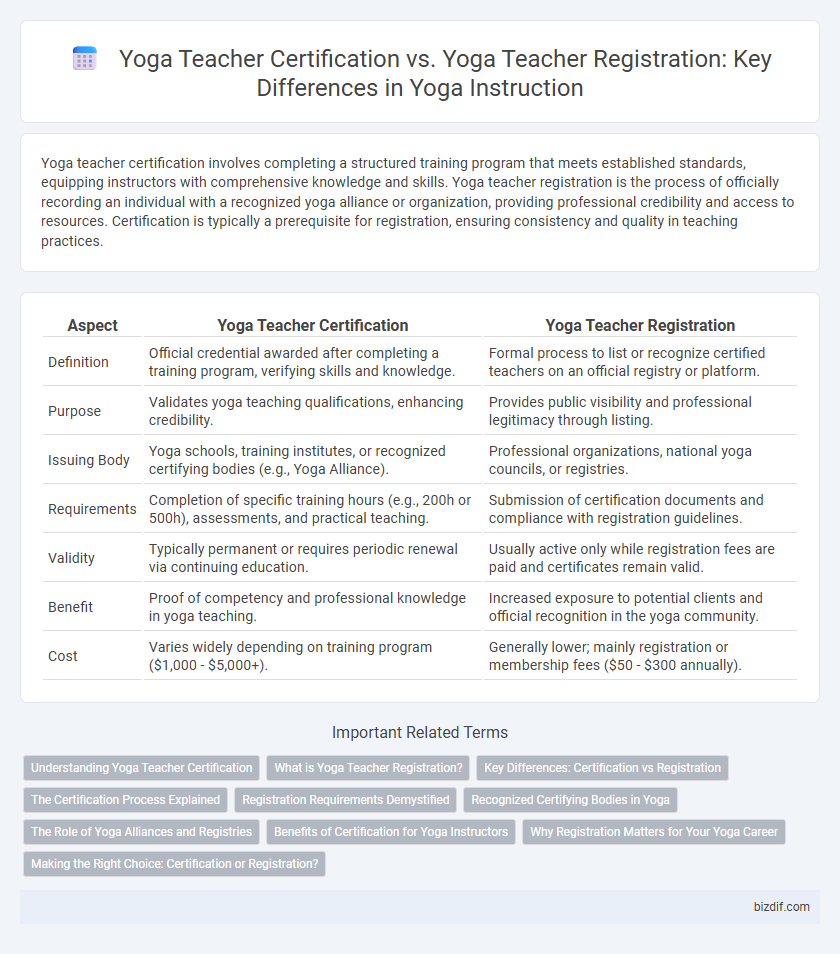Yoga teacher certification involves completing a structured training program that meets established standards, equipping instructors with comprehensive knowledge and skills. Yoga teacher registration is the process of officially recording an individual with a recognized yoga alliance or organization, providing professional credibility and access to resources. Certification is typically a prerequisite for registration, ensuring consistency and quality in teaching practices.
Table of Comparison
| Aspect | Yoga Teacher Certification | Yoga Teacher Registration |
|---|---|---|
| Definition | Official credential awarded after completing a training program, verifying skills and knowledge. | Formal process to list or recognize certified teachers on an official registry or platform. |
| Purpose | Validates yoga teaching qualifications, enhancing credibility. | Provides public visibility and professional legitimacy through listing. |
| Issuing Body | Yoga schools, training institutes, or recognized certifying bodies (e.g., Yoga Alliance). | Professional organizations, national yoga councils, or registries. |
| Requirements | Completion of specific training hours (e.g., 200h or 500h), assessments, and practical teaching. | Submission of certification documents and compliance with registration guidelines. |
| Validity | Typically permanent or requires periodic renewal via continuing education. | Usually active only while registration fees are paid and certificates remain valid. |
| Benefit | Proof of competency and professional knowledge in yoga teaching. | Increased exposure to potential clients and official recognition in the yoga community. |
| Cost | Varies widely depending on training program ($1,000 - $5,000+). | Generally lower; mainly registration or membership fees ($50 - $300 annually). |
Understanding Yoga Teacher Certification
Yoga teacher certification validates an instructor's completion of specific training hours and mastery of yoga techniques, anatomy, and teaching methodologies, often aligned with standards set by organizations like Yoga Alliance. Certification ensures credibility, enhances professional opportunities, and demonstrates a commitment to maintaining high teaching quality. Understanding this distinction clarifies that certification is an earned credential, whereas registration typically involves listing with a professional body without necessarily verifying training or expertise.
What is Yoga Teacher Registration?
Yoga teacher registration is the process where certified instructors officially enroll with recognized yoga organizations or governing bodies to validate their teaching credentials and maintain professional standards. Registration typically involves submitting proof of certification, adhering to a code of ethics, and paying a fee to gain access to resources, insurance, and networking opportunities. This formal acknowledgment helps build credibility, enhances career prospects, and ensures compliance with industry regulations.
Key Differences: Certification vs Registration
Yoga teacher certification demonstrates that an instructor has completed a recognized training program, meeting specific standards of knowledge and practice. Yoga teacher registration, however, involves enrolling with a professional organization or governing body, which may require certification but primarily serves to verify credential status and allow access to membership benefits. Certification focuses on verified skills and education, while registration emphasizes official recognition and ongoing professional affiliation.
The Certification Process Explained
The yoga teacher certification process involves completing a structured training program, typically 200 or 500 hours, recognized by organizations such as the Yoga Alliance, ensuring comprehensive study of anatomy, philosophy, and teaching methodology. Certification serves as a formal validation of a teacher's skills and knowledge, often requiring assessment through practical teaching hours and written exams. Registration, on the other hand, is the official listing of certified teachers with a governing body, providing public recognition and credibility but depends on the successful completion of the certification process.
Registration Requirements Demystified
Yoga teacher registration requires meeting specific criteria such as completion of accredited training hours, adherence to ethical codes, and ongoing professional development, which ensures standardization across instructors. Certification typically involves passing a course or exam, but registration demands continual compliance with regulatory bodies, reflecting a commitment to maintaining teaching quality. Understanding these registration requirements demystifies the process, highlighting accountability and legitimacy in the yoga profession.
Recognized Certifying Bodies in Yoga
Yoga teacher certification is awarded by recognized certifying bodies such as the Yoga Alliance, International Association of Yoga Therapists, and British Wheel of Yoga, which establish rigorous standards for training and expertise. Certification from these organizations ensures that instructors have completed verified training hours, adhere to professional ethics, and maintain continuing education requirements. In contrast, yoga teacher registration may simply involve listing with local or national directories without validating the teacher's credentials or training through an accredited system.
The Role of Yoga Alliances and Registries
Yoga teacher certification validates an instructor's skills and knowledge through comprehensive training programs, while Yoga teacher registration with organizations like Yoga Alliance maintains professional standards and offers public recognition. Yoga Alliance serves as a global registry that verifies certified teachers, promoting credibility and consistency in teaching practices. Registries also facilitate networking opportunities and access to continuing education, ensuring ongoing professional development.
Benefits of Certification for Yoga Instructors
Yoga teacher certification validates an instructor's expertise through standardized training, enhancing credibility and attracting more students. Certified teachers often access advanced teaching resources, professional networks, and insurance benefits that support career growth. This credential demonstrates commitment to quality and safety, increasing trust among clients and studios alike.
Why Registration Matters for Your Yoga Career
Yoga teacher registration validates your certification by officially recognizing your credentials within professional organizations and regulatory bodies, enhancing your credibility and trustworthiness to clients. Registered teachers gain access to valuable resources, legal protections, and networking opportunities that support ongoing professional development and career growth. Registration also aligns you with industry standards, ensuring adherence to ethical practices and improving job prospects in competitive markets.
Making the Right Choice: Certification or Registration?
Choosing between Yoga teacher certification and registration hinges on your career goals and credibility needs within the yoga community. Certification, often provided by accredited bodies like Yoga Alliance, involves comprehensive training and assessment, establishing verified expertise and adherence to industry standards. Registration, typically a simpler process, offers recognition without rigorous evaluation, suitable for those seeking basic acknowledgment rather than formal qualification.
Yoga teacher certification vs Yoga teacher registration Infographic

 bizdif.com
bizdif.com